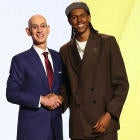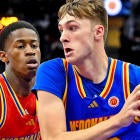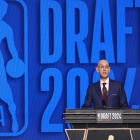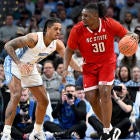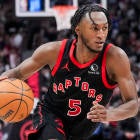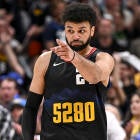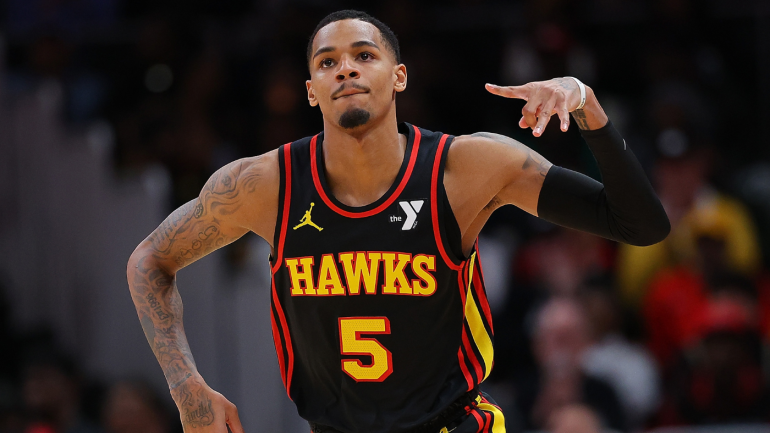
When the Hawks landed Dejounte Murray two years ago, he was supposed to be their missing piece. A defensive guard who could lock down opposing ball-handlers and minimize Trae Young's weaknesses on one end of the floor and a secondary ball-handler who would force Young to participate more in the offense as an off-ball mover on the other was exactly what we all thought the Hawks needed.
It hasn't worked out that way. The Hawks haven't won a playoff series with Murray. He and Young couldn't even beat a Jimmy Butler-less Heat team in the Play-In round last season. The fit between the two clearly hasn't worked. If the Hawks could have gotten a fair return, they might have traded him at the deadline.
Instead, they're re-evaluating their options now. So what is the latest on the Murray trade front? Where might he go? And what are the odds that the Hawks ultimately keep him?
Why he's in trade rumors
The Hawks acquired Murray thinking he would take them to the next level. They are 72-80 in games he has played for them. The minutes he shared with Trae Young saw the Hawks outscored by 169 points last season, the worst plus-minus of any two-man combination in Atlanta. Murray has averaged over 25 points per game and nearly nine assists in games that Young has missed since then, but only 20.4 points and 5.5 assists with him. This duo does not work. They hold each other back.
There are some irreparable offensive issues at play here, but it hasn't helped that the Hawks acquired Murray thinking he was a star defender when he hasn't been. Atlanta's defense was seven points per 100 possessions better when Murray was on the bench this season. Murray was an All-Defense pick during the 2017-18 season. At that point, he had an estimated plus-minus of +1.8 on defense. This season, he was down to -1.3. He's declined precipitously, and even if that's a combination of effort and fit, it's not what the Hawks thought they were getting.
Young has proven he can be the offensive catalyst for a contender. Even if it was a one-time occurrence, he did get the Hawks to the Eastern Conference finals. He also has seniority in Atlanta as a player the Hawks drafted. Trading Young would be a far more complicated process than giving up Murray. They're going to be broken up, and in those situations, the player widely believed to be the worse of the two usually winds up getting moved.
Why the Hawks would keep him
Well, for starters, their coach wanted them to. At least at the deadline, Quin Snyder reportedly urged the front office to keep Murray, according to Marc Stein. He had reason to. The Hawks went 17-18 with Murray and no Young over the past two seasons compared to 60-69 when they played together. Murray is bigger. He is more versatile. While he may not be the better player of the two, he is the easier one to build a team around.
He is also far cheaper, and that means a good deal in the second-apron world we now live in. Murray is set to make only $114 million over the next four seasons, assuming he picks up his 2027-28 player option. That's a bargain. Remember, Jerami Grant will earn more than him in that span without ever having made an All-Star team. Young, on the other hand, will make $89 million over the next two seasons, and if he re-signs, his next contract is going to be significantly bigger. Would you rather have, say, the 25th-best player in the NBA for max money, or the 40th-best player for half of that?
The Hawks were already facing a bit of a tax crunch for next season, and the No. 1 pick only makes their roster more expensive. They are going to have to shell out for Jalen Johnson in a rookie extension this offseason. Onyeka Okongwu and De'Andre Hunter already got theirs. If the Hawks like the bulk of their team and are only looking to make one major change, a Young deal takes them further than a Murray trade would.
What destinations make sense?
Murray can work on several teams, but he's not as easy a fit as, say, Mikal Bridges would be. He needs to play point guard. He needs to be surrounded by shooting, because while he has improved, he still isn't great from 3-point range. He would also probably be best-served playing on a strong defensive team. If he can revert to his younger form on that end, great, but it isn't something a new team can rely on. Here are three teams that make some sense.
New Orleans Pelicans: The Pelicans need a point guard and were interested in Murray in February. In Brandon Ingram, they could send the Hawks back a high-end wing that would help balance their roster out a little bit, and such a deal would help the Pelicans with their impending tax problems (though create new ones for the Hawks if Ingram extends). This is one of the easier player-for-player trade ideas of the offseason. It fills a need for both teams with players of similar stature and age. Both teams have surpluses at the positions they'd be trading from, so something with this base would work for both sides provided the Hawks plan to remain in win-now mode.
Los Angeles Lakers: The Lakers looked into a Murray trade at the deadline, but had only one first-round pick to offer. Now they have three, potentially opening the door for a swap. Murray is represented by Klutch Sports, which connects him to LeBron James and Anthony Davis. James would need to give up some ball-handling responsibility to make life easier on Murray, but it would be easier for Los Angeles to match his salary than some of the max-level guards they've also been linked to. Murray would have to improve defensively back to where he was as a Spur for this deal to be worthwhile for the Lakers. Otherwise, it's only a slight upgrade on D'Angelo Russell. But if he could, it would have real upside for the Lakers.
Brooklyn Nets: The Nets want a superstar to pair with Bridges. Their presumed first choice, Donovan Mitchell, doesn't seem as available as previously believed. Murray is a middle-ground option. He's not a star, but he won't cost star prices either. The Nets could grab him while retaining the bulk of their trade assets in an effort to improve this season while courting a true superstar in the 2025 offseason. Brooklyn badly needs guard help, so if they're desperate to improve now, Murray makes some sense as a short-term upgrade.
What is the latest reporting?
Most of the reporting on the Atlanta trade market has focused on Young, but there have been a few worthwhile nuggets on Murray. The Jazz, for instance, reportedly turned down an offer of Murray for young guard Keyonte George. The Pelicans reportedly consider Murray more valuable than Young, which is a sentiment that has floated around several teams this offseason. Whether that means Murray's value has grown or Young's value has shrunk is uncertain, but it seems as though he'll have a reasonable market this offseason.












